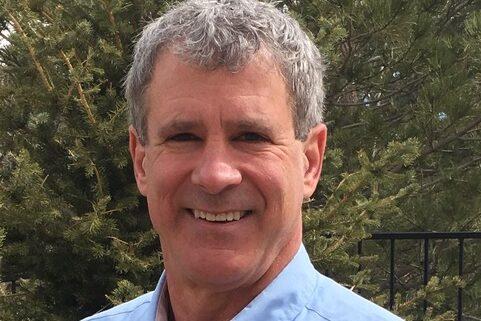
KRCC News sent questions to candidates based on issues voters say are some of the most critical facing El Paso County. Here are the answers provided by the candidates running for El Paso County Commission seats 2, 3 and 4.
Bill Wysong's responses are below. Find out more about the candidate here.
Why should El Paso County voters vote for you?
El Paso County voters should consider voting for me because I am committed to addressing the most pressing issues facing our community with practical, common-sense solutions. I believe in enhancing public safety through a comprehensive approach to law enforcement against increasing crime, emphasizing community engagement, and increased mental health support. Furthermore, I advocate for an illegal immigration policy that prioritizes citizens first, security and responsible law enforcement. I support measures that hold individuals accountable for their actions, whether they are citizens or non-citizens, ensuring that our laws are respected and maintained. My focus is on fostering a strong sense of community, investing in necessary resources, infrastructure, and collaborating with local organizations to create a safer and more prosperous environment for all residents. With a strong foundation in accountability, responsibility and transparency plus a dedication to effective leadership, I am ready to represent and serve the interests of El Paso County as County Commissioner District 3.
Immigration
Earlier this year, El Paso County commissioners publicly stated the county’s position on the “local migrant situation” in Colorado. Commissioners said the county will not be designated as a “sanctuary county.”
What is your stance on immigration as it relates to El Paso County? Please include whether or not you believe there is a problem with the current situation in the county with regard to immigration, whether the county is adequately prepared and whether you believe in offering sanctuary or financial support to new immigrants.
El Paso County commissioners have made it clear that they will not designate the county as a "sanctuary county" in response to local illegal migrant issues. This decision reflects the county's position on immigration policy and its strategy for addressing the challenges related to the illegal migrant situation in Colorado. The commissioners likely aim to balance community safety with the concerns of residents while navigating the complexities of illegal immigration. I fully support the El Paso Board of County Commissioners in their letter to Governor Polis and endorse the lawsuit filed by the El Paso County Sheriff against the state, regarding the ban on releasing illegal immigrants to ICE. I strongly believe that illegal immigration is a significant issue in the United States. Illegal immigrants come from over 90 different countries, making this a pressing concern for the federal government. In 2017, it was estimated that illegal immigration costs taxpayers over $135 billion annually. Given the numerous citizens in need of assistance, it becomes challenging to justify allocating such a substantial amount to individuals who have, by definition, violated the law. The United States is a nation governed by laws, and maintaining a civilized society requires adherence to these laws. Those who break the law should face consequences, which should include deportation.
Public Safety
In 2019, Colorado passed a “red flag” law that would allow certain people to request the temporary confiscation of firearms from people who pose a threat. That same year, El Paso County declared itself a “Second Amendment preservation county.” It meant commissioners would not “appropriate funds, resources, employees or agencies to initiate unconstitutional seizures” in the unincorporated areas of the county.
Do you agree or disagree with the county’s position as a Second Amendment preservation county? Please include what you believe would be the best way to balance the need to preserve Second Amendment rights while preventing suicides or other firearms deaths.
Designating a county as a Second Amendment preservation county signals a commitment to uphold the rights enshrined in the Second Amendment of the U.S. Constitution. I strongly support the Second Amendment, believing it is vital for protecting individual freedoms and the right to bear arms, which are essential for personal security and guard against government overreach. However, to effectively balance the preservation of Second Amendment rights with the need to reduce firearm-related deaths, a comprehensive approach is necessary: First and foremost, we must instill a sense of personal responsibility among all citizens in the U.S. Those who commit crimes with firearms should face prosecution without leniency—no early parole until at least 85% of their sentence has been served. Here are a few key strategies to consider: 1. Education and Training: Encourage responsible gun ownership through training programs that focus on safe storage, responsible handling, and conflict resolution techniques. 2. Mental Health Resources: Expand access to mental health services and support systems to address underlying issues related to violence and suicide. Community outreach programs can help individuals seek assistance before crises escalate. 3. Research and Data Collection: Support and fund research into firearm-related deaths, including the circumstances surrounding suicides, to inform policies aimed at reducing these tragedies while respecting individual rights. Ultimately, by fostering a culture of personal responsibility and awareness around gun ownership, while emphasizing mental health and safety, we can create a society that honors Second Amendment rights while addressing the pressing need to prevent firearm-related deaths.
What is the most pressing public safety issue facing the county and how would you address it?
As a candidate for El Paso County Commissioner, supporting the El Paso County Sheriff and the District Attorney is a top priority, and this commitment will continue into my role as a commissioner. The connection between drugs and crime is evident, and while addressing the influx of drugs and illegal immigration is vital, it is primarily a responsibility that falls beyond El Paso County. We must, however, support efforts in this area. It’s also important for all citizens in El Paso County and across the U.S. to embrace the concept of personal responsibility. When U.S. citizens commit crimes, they should face appropriate consequences. Likewise, non-citizens who are arrested, prosecuted, and convicted should be incarcerated and subsequently deported. Additionally, it is crucial to prioritize preparedness for environmental disasters. Having experienced the devastating effects of the Waldo Canyon Fire and, to a lesser extent, the Black Forest Fire, I believe the county must adopt a proactive stance to prepare for potential disasters. Implementing advance planning and evacuation modeling is essential for ensuring public safety.
Water and Infrastructure
The issue of water and infrastructure as it relates to growth is top of mind for many El Paso County residents. For example, many are concerned about a depleting Denver Basin. There is also a recent ordinance in Colorado Springs that can limit annexations based on water supply.
With this in mind, how should the El Paso County Commission approach new developments as it relates to water and other infrastructure? Please include the kinds of requirements you believe developers should meet.
Addressing water and infrastructure issues in El Paso County demands a comprehensive strategy that harmonizes growth with sustainability. Given the challenges surrounding the Denver Basin and other aquifers, along with recent developments like Colorado Springs' water ordinance, the El Paso County Commission should take proactive steps to ensure that new developments prioritize the long-term health of the region’s water supply and infrastructure. Here are several recommendations for the commission to consider: 1. Establish a Water Supply Assessment Framework: Create a thorough assessment framework to evaluate the long-term water supply and demand implications of proposed developments. This framework should include: - Hydrological Studies: Collaborate with the State of Colorado to conduct in-depth studies on water availability, quality, and groundwater recharge rates. - Demand Forecasting: Require developers to project water usage based on household size, landscaping, and commercial needs, using local historical data for support. 2. Mandate Water Resource Engagement: Developers should be required to engage with local water authorities to secure guaranteed water rights or alternative water supply solutions prior to seeking development approval: - Water Rights Verification: Ensure developers have legally secured the necessary water rights for their projects. - Alternative Water Sources: Work with the State of Colorado to explore alternative water sources, such as reclaimed water and rainwater collection systems, while safeguarding downstream requirements and recharging the aquifers supplying most water to unincorporated areas of El Paso County. 3. Implement Infrastructure Improvement Contributions: Developers should contribute to infrastructure improvements that are proportional to the impact of their projects: - Impact Fees: Introduce impact fees that developers must pay for the enhancement of water infrastructure, road improvements, and other essential services their projects will burden. - In-Kind Contributions: Allow developers to make direct contributions to infrastructure improvements, such as extending water lines or enhancing roads as part of their development plans. 4. Adopt Stricter Land Use Policies: The county should consider implementing stricter land use regulations that align with its water resources and infrastructure capacity. 5. Establish Monitoring and Review Processes: Set up a robust monitoring system to assess the effectiveness of water management and infrastructure planning related to new developments. By adopting these measures, the El Paso County Commission can foster responsible growth while protecting the community's water resources and infrastructure. These regulations will not only enhance El Paso County's resilience but also reassure residents that growth will be managed in a sustainable and responsible manner.
Open Spaces
The county is currently undergoing a master planning process for Paint Mines Interpretive Park, in part to help account for an increase in visitors to the 750 acres of open space.
What are your thoughts about protecting, maintaining and/or perhaps growing parks and open space within the purview of the El Paso County Board of Commissioners?
Protecting and preserving parks and open spaces is a key focus of my campaign for County Commissioner. 1. Conservation of Natural Resources: Parks are vital habitats for various plant and animal species. Thoughtful master planning can safeguard these ecosystems, ensuring biodiversity and protecting our natural resources. 2. Public Health and Well-being: Access to parks and open spaces encourages physical activity and promotes mental health. By designing well-planned facilities, we can enhance community health and foster responsible use of these areas. 3. Community Engagement: Involving local residents in the planning process fosters a sense of ownership and responsibility. Hosting workshops and feedback sessions can help create a master plan that aligns with the needs and preferences of park users. 4. Educational Opportunities: Parks provide excellent venues for environmental education. Incorporating educational programs into the master plan can raise awareness about the local ecosystem and the importance of conservation, helping to mitigate negative impacts. 5. Collaborative Management: Partnering with non-profits, local businesses, and volunteer organizations can strengthen resource management and community involvement, creating diverse perspectives and additional resources for park stewardship. 6. Long-term Planning: It is essential to focus on long-term land management, climate resilience, and adapting to environmental changes while preserving the integrity of our parks. The El Paso County Board of Commissioners has a significant opportunity to develop a master plan for the Paint Mines and other parks. This plan should include a needs assessment for new parks and open spaces, balancing preservation with community needs and increased visitation. By prioritizing these elements, we can create a more sustainable and enjoyable environment for both residents and visitors in El Paso County.
What else would you like to address?
I strongly believe that humanity should extend a helping hand to those in need. However, simply providing handouts can perpetuate the behaviors that led individuals to their current situation. Instead, we should focus on offering support that encourages self-sufficiency and growth.









